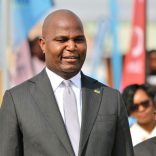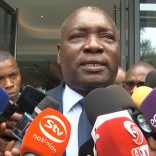Mozambique: Chapo urges young Africans to transform the continent
Constitutional amendments await go-ahead from Nyusi and Dhlakama – AIM report

File photo: Twitter @basiliomuhate
The fate of the constitutional amendments before the Mozambican parliament, the Assembly of the Republic, is now entirely in the hands of President Filipe Nyusi and of the leader of the Renamo rebels, Afonso Dhlakama.
The chairperson of the Assembly’s Constitutional and Legal Affairs Commission, Edson Macuacua, told reporters on Monday that his commission cannot complete its written opinion on the amendments before Nyusi and Dhlakama have unblocked the latest impasse.
A second key commission, that on Public Administration and Local Power, is also at a standstill, reports Tuesday’s issue of the independent newssheet “Mediafax”. Without the written opinions of these two commissions, debate on the constitutional amendments cannot take place in the Assembly plenary.
The problem is who should appoint district administrators in the interval between the general elections of 2019 and the first ever elections of district assemblies, in 2024.
Since the question was not so much as mentioned in the consensus between the government and Renamo, unveiled by Nyusi in February, it was widely assumed that the current arrangement, whereby the Minister of State Administration appoints district administrators, would remain in force until 2024.
But Renamo has now objected, and wants the provincial governors to appoint the administrators. Obviously Renamo regards this as a way of appointing administrators from its own ranks without going through a district election (on the assumption that several of the governors elected in 2019 will be Renamo members).
The parliamentary group of the ruling Frelimo Party has opposed the Renamo move. For Renamo the transitional arrangements for district administrators between 2019 and 2024 must be part of the constitutional amendments. Frelimo, however, says that the regime for appointing administrators in this relatively short period has no place in the constitution, and can be dealt with in an ordinary law. With no compromise possible, the Frelimo and Renamo groups could only agree to refer the matter to their top leaderships, Nyusi and Dhlakama.
Frelimo and Renamo diverge over district administrators – AIM report
Watch: Constitutional amendments can be improved – Nyusi
Concluding the constitutional amendments will depend on solving this pending issue, said Macuacua. “This point can only be overcome through intervention at the highest level”, he stressed.
He regarded the Renamo proposal as an alteration to the agreement reached by Nyusi and Dhlakama, and so only Nyusi and Dhlakama could authorise the change.
Most other issues seem concluded. Frelimo, Renamo and the second opposition party, the Mozambique Democratic Movement (MDM), have agreed that future elections of municipal, provincial and district assemblies will be on a “head of the list” basis. That means that each party or group competes with a list of candidates for the Assembly and the head of the list of whichever party wins will become the mayor, provincial governor or district administrator.
The initial proposal from Nyusi and Dhlakama was that the winning party in any assembly can choose whichever assembly member it likes for the top job. This was widely regarded as unconstitutional, since it transferred power away from the electorate and into the hands of the political parties. When voting for the assemblies, the voters would have no idea who they were choosing as mayor, governor or administrator.
The “head of the list” system solves this problem and, although there might only be one ballot paper, it would serve for electing both the assembly and the mayor, governor or administrator.
Mozambique: Would constitutional changes represent democratic backsliding?
Dhlakama sees no reason to hold a referendum – Mozambique
All eyes on what may be Mozambique’s last direct election of a mayor
But if agreement seems near over the constitutional amendments on decentralisation, the second issue in the negotiations between the government and Renamo – the disarming and demobilisation of the Renamo militia – is still unresolved.
Nyusi has warned that decentralisation goes hand in hand with disarming Renamo. Speaking at the opening of a Frelimo Central Committee meeting in late March, Nyusi said “I would like to stress that the decentralisation package, and the demilitarisation, demobilisation and reintegration of the Renamo men are two inseparable components. These are two processes which should advance at the same pace and in the same direction, which is to achieve effective and definitive peace”.
Proposed constitutional changes give “limited powers” to provincial and district assemblies – CIP
Senior Constitutional expert warns against abolishing direct election of mayors












Leave a Reply
Be the First to Comment!
You must be logged in to post a comment.
You must be logged in to post a comment.